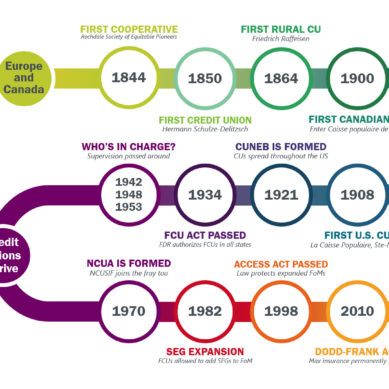Amidst growing concerns about COVID-19, or coronavirus, there is a great deal of uncertainty about how it will affect businesses and services long-term. A recent report from the LA Times suggests that 18% of U.S. workers have lost jobs or hours since coronavirus hit, based off results of a survey conducted by NPR, PBS NewsHour, and The Marist Poll. Not surprisingly, the highest percentage of those affected were from low-income households.
As more and more businesses are forced to shutdown, there is a growing concern among the population about how far those financial hardships will extend. People working paycheck to paycheck may find they don’t have the cushion to continue making payments on loans while also providing for families. And the penalties that this might otherwise result in would only serve to exacerbate the situation.
Fortunately, credit unions and other financial institutions are not without practice responding to these kinds of situations. In fact, credit unions have dealt with vaguely similar circumstances within the last 18 months!
In the wake of a long-standing government shutdown as the federal government bickered on budget, many federal employees were left to deal with the consequences of their representatives’ actions. Fortunately, credit unions answered the call. The lessons learned from that shutdown will be needed to help not just members, but also credit union staff grappling with an unprecedented situation. Here are a few options credit unions may want to implement to respond to the needs of their communities.
Emergencies loans and easing loan burden
Credit unions can employ a variety of solutions that serve to either ease members’ loan responsibilities temporarily or provide emergency funds to those in need. Skip-a-payment offerings for one or more months may give members the cushion they need to not have to choose between making a loan payment to avoid late fees and providing necessities for their families. Another option is to extend lines of credit with a zero percent interest rate for a temporary period, for example 30 to 90 days.
During the government shutdowns, some credit unions offered members low limit, unsecured loans at extremely low or no interest rates, and waived associated fees. Although the terms of the loans being offered by credit unions during the government shutdown often differed, the goal was the same: to aid members in trying times.
However, with the government shutdown, furloughed employees often received back pay at a later date, making it easier for them to repay those loans. The issue credit unions will need to consider is how to offer these options to members that may have found themselves recently unemployed.
Waiving fees
Many credit unions waived fees that would have surged during the shutdown. If skip-payments weren’t offered, some allowed refunds on late payment fees for mortgages and home equity loans. This also could extend to credit cards and other lines of credit. Other than fees associated with loans, consider other fees that might pop up, including checking overdraft and minimum balance fees.
Promotion and education of self-service options
This pandemic has created a slew of other complications far beyond what credit unions and their members faced during the 2019 government shutdown. As health officials urge “social distancing” and limiting exposure with others, credit unions have responded in kind by shutting down branches or switching to drive-thru only. This can cause a great deal of anxiety for members needing service, but also to those who are otherwise unaware or unfamiliar with self-service options the credit union offers.
In addition to informing members of changes to credit union operations, now presents an excellent and necessary opportunity to reeducate members on digital options available to them. Politicians are urging the government to provide immediate assistance to U.S. households by sending checks to help ease the financial burden. How will members deposit those checks should they come? If your credit union offers mobile RDC, remind them that this option will give them the ability to deposit those checks without having to leave the house.
The same goes for applying for loans, emergency or otherwise. With the technology offered today–online application, instant underwriting and approval, and e-signature–credit unions can tell members that they can get their loans without having to come into the office to discuss options or sign paperwork.
Preventing panic through reeducation of credit union values (and insurance)
Have you been to the store lately? Was there any toilet paper there? Chances are, no. What likely started as a few panicked individuals believing they’d be without those bare necessities very quickly transformed into a frenzy as consumers rushed to stores believing if they didn’t get their TP now, there may not be any later! What we were witnessing was a run on the bank of toilet rolls.
Now we’re starting to hear reports of people withdrawing large sums of cash from their accounts. In Wisconsin, credit unions and banks have started seeing a surge in cash withdrawals from members who presumably worry for their money’s safety. New York is seeing a similar trend. Financial institutions are doing their best to get the word out that consumers’ money is backed by the NCUA and FDIC (or in some cases private insurers) for up to $250,000.
The general population needs soothing. Anxiety is rising and our credit unions need to do their best to calm those fears by reminding members their money is far safer at the credit union than under their mattress.
Coronavirus is not a government shutdown. This doesn’t stop at government employees, but affects members of all walks of life, as well as the credit unions themselves. But it also gives our industry a chance to do what it does best. Help the communities they reside in as best they possibly can.
























































